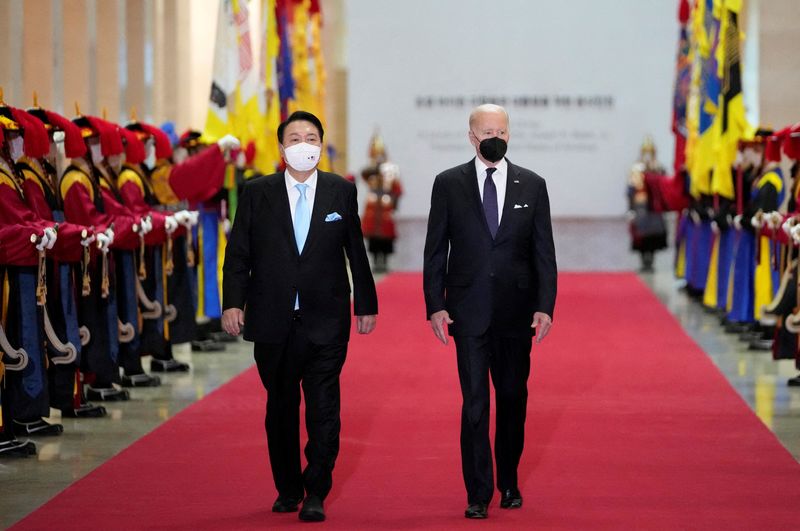By Josh Smith
SEOUL (Reuters) - South Korea’s new president, Yoon Suk-yeol, used a largely successful summit with U.S. President Joe Biden over the weekend to lay the foundation for his goal of enabling South Korea to play a more active role around the world.
Inaugurated on May 10, Yoon has said his main foreign policy goal will be to make South Korea a “global pivotal state” with a focus on promoting freedom, peace, and prosperity based on its liberal democratic values and cooperation.
That closely mirrors Biden's call for "like-minded" democracies with shared values to work together, allowing the pair to commit to a strikingly long list of areas for cooperation, setting the bar high on promises but also underscoring how Yoon sees closer U.S. ties as his path toward global engagement.
"Yoon has clearly tried to use this visit as a way to launch his 'global pivotal state' agenda," said Ramon Pacheco Pardo, the Korea chair at the Brussels School of Governance.
The two leaders signalled in a summit joint statement support for Biden’s framework for economic cooperation in Asia even before it was unveiled, pledged cooperation on everything from international cooperation on nuclear power to cybersecurity, and included mentions of the Taiwan, the South China Sea, and Russia's war in Ukraine.
The language on Taiwan and the South China Sea was not a dramatic change from that of Yoon's liberal and generally cautious predecessor, Moon Jae-in, but that could change, Pacheco Pardo said.
"I do think that Yoon will be willing to join condemnation of China as part of groups of like-minded countries in due course," he said.
Pacheco Pardo was sceptical that South Korea would soon change its policy of providing only non-lethal aid to Ukraine, and said that there was no real pressure from NATO for the Asian partner to provide weapons.
But other analysts saw signs that the language on Ukraine could be setting the political groundwork for Yoon to boost aid.
"Ukraine is seen by Washington as a litmus test for its coalition of countries with shared values, so I wouldn't be surprised if there are more discussions down the road on South Korea providing aid, including possibly weapons," said Mason Richey, a professor at Hankuk University of Foreign Studies in Seoul.
More vocal support for Ukraine and improving relations with fellow U.S. ally Japan are two areas in which Yoon may most differ from his predecessor, and both will play well in Washington, he added.
CHINA'S SHADOW
North Korea’s increased weapons testing threatens to undermine Yoon’s attempts to look beyond the peninsula, however, and like Biden, he will have to prove to the domestic audience that foreign engagement is improving lives at home.
Yoon's focus on economic cooperation and his commitment to join the U.S.-led Indo-Pacific Economic Framework for Prosperity (IPEF), a programme that Biden launched in Japan on Monday, to bind regional countries more closely through common standards in areas including supply-chain resilience, clean energy, infrastructure and digital trade, were particularly notable, Pacheco Pardo said.
"Joining IPEF, in my view, is more significant than we may realise because China explicitly asked Korea not to do so," he said.
China is South Korea's biggest trading partner, and South Korea has previously faced economic retaliation for defying China.
Likely with those interests in mind, Yoon's team stressed that the IPEF did not explicitly exclude China and that it was natural and a vital national interest for South Korea to participate in that kind of rule-making process.
South Korea intends to develop its partnership with China through "qualitative and quantitative economic cooperation", the foreign ministry said.

"The IPEF and efforts to build a norms-based order, etcetera, are partly intended to keep China in check, but by not directly mentioning the word 'China', they seemed to try to keep the principle of mutual respect," said James Kim, a research fellow at the Asan Institute for Policy Studies in Seoul.
Some opposition lawmakers criticised Yoon for risking antagonising China but Kim said the president might have been making tacit acknowledgment of rising anti-China sentiment among many South Koreans.